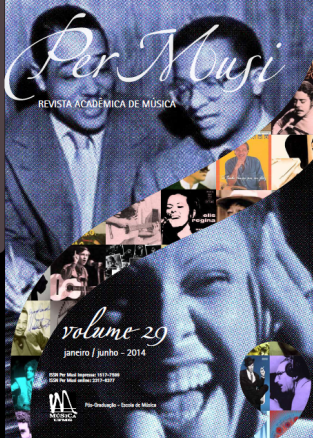Sobre flores e canhões
canções de protesto em festivais de música popular
Palavras-chave:
Festivais de música popular brasileira, Canções de protesto, História da cultura, Fenomenologia da música, Música Popular BrasileiraResumo
O presente artigo aborda algumas canções de protesto apresentadas nos Festivais da Música Popular realizados no período 1965-1969, buscando compreendê-las em sua inserção no momento social e político em que surgiram e se fizeram ouvir. Foram realizadas análises de vídeos e áudio das apresentações das canções escolhidas, segundo a visão da História Cultural, baseada em aportes teórico-metodológicos da fenomenologia e da dialética. Desse modo, foram privilegiadas a escuta e as observações das autoras frente às gravações da época. As conclusões apontam algumas convergências entre as características das canções analisadas, revelando também que elas atuaram veladamente como instrumento político de contestação.
Referências
ANDRADE, Carlos Drummond de. Artigo (sem título). Disponível em: <http://www.chicobuarque.com.br/texto/artigos/mestre.asp?pg=opartigo_drummond.htm>. In: <http://www.chicobuarque.com.br/> Acessado em: 04 out. 2007.
AUGUSTO, Erika Soares. As flores vencendo os canhões: Festivais e Canções de Protesto. 2009. Dissertação (Mestrado em Música). Centro de Letras e Artes, Escola de Música, Universidade Federal do Rio de Janeiro (UFRJ), Rio de Janeiro, 2009.
BERGER, Harris M. Metal, Rock, and Jazz: Perception and the phenomenology of musical experience. United States of America: Wesleyan University Press, 1999.
BURKE, Peter (org.). A escrita da história. São Paulo: USP, 1992.
______. O que é história cultural? Rio de Janeiro: Jorge Zahar, 2005. Tradução de Sérgio Góes de Paula de “What is cultural history?”.
CATROGA, Fernando. Memória, História e Historiografia. 1.ed. Coleção Opúsculos. Coimbra-Portugal: Quarteto Editora, 2001.
CÉSAR, Lígia Vieira. Poesia e política nas canções de Bob Dylan e Chico Buarque. São Paulo: Novera Editora, 2007.
CHAVES, Celso Loureiro. Memórias do passado no presente: a fenomenologia de “Transa”. Rio Grande do Sul: UFRGS, 1996.
CLIFTON, Thomas. Music as Heard: A study in applied Phenomenology. New Haven: Yale University Press, 1983.
COUTINHO, Eduardo Granja. Velhas histórias, memórias futuras: o sentido da tradição na obra de Paulinho da Viola. Rio de Janeiro: EdUERJ, 2002.
DANIELSEN, Anne. Presence and Pleasure – The Funk Grooves of James Brown and Parliament. EUA: Wesleyan University Press, Middletown, 2006.
Dicionário Grove de Música: edição concisa. Editado por Stanley Sadie; tradução Eduardo Francisco Alves. Rio de Janeiro: Jorge Zahar Ed., 1994. Tradução de: The Grove concise dictionary of music.
Enciclopédia da Música Popular Brasileira: erudita, folclórica e popular. 2.ed. São Paulo: Art Editora, 1998. ver. Ampl.
FAVARETTO, Celso. Tropicália, alegoria, alegria. 3.ed. São Paulo: Ateliê Editorial, 2000.
FERRARA, Lawrence. Phenomenology as a Tool for Musical Analysis. In: The Musical Quarterly. New York, 1984. v. 70, n° 3, p.355-373.
______. Richness or Chaos?: Toward a Phenomenology of Musical Interpretation. In: Qualitative Evaluation in the Arts, 1982. 2, p.197-208.
FINNEGAN, Ruth. O que vem primeiro: o texto, a música ou a performance?. In: MATOS, Cláudia Neiva de; TRAVASSOS, Elizabeth; MEDEIROS, Fernanda Teixeira (org.). Palavra Cantada: ensaios sobre poesia, música e voz. Rio de Janeiro: 7 Letras, 2008, p.15-43.
FREIRE, Vanda Lima Bellard. A História da Música em Questão: uma reflexão metodológica. Publicado em Fundamentos da Educação Musical, v.2. Porto Alegre: ABEM / 1994.
______. Música e Pesquisa: novas abordagens. Belo Horizonte: Escola de Música da UFMG, 2007.
GINZBURG, Carlo. O queijo e os vermes: o cotidiano e as ideias de um moleiro perseguido pela inquisição. São Paulo: Cia das Letras, 1987.
HOLANDA, Chico Buarque de. A Banda. Vídeo. Disponível em: <http://www.youtube.com/watch?v=HEqkkSE3V2E>. Acessado em: 04 out. 2007.
______. Roda-Viva. Vídeo. Disponível em: <http://www.youtube.com/watch?v=HRFw5u5wR4c>. Acessado em: 31 jan. 2008.
MELLO, Zuza Homem de. A Era dos Festivais: uma parábola. São Paulo: Ed. 34, 2003.
NAVES, Santuza Cambraia. Canção Popular no Brasil. Rio de Janeiro: Civilização Brasileira, 2010.
SOUZA, Luciana Câmara Queiroz de. Tempo e espaço nos Ponteios de M. Camargo Guarnieri: Subsídios para uma caracterização fenomenológica da coleção. 2000. Dissertação (Mestrado em Música). Centro de Letras e Artes, Escola de Música, Universidade Federal do Rio de Janeiro, Rio de Janeiro, 2000.
VANDRÉ, Geraldo. Pra não dizer que não falei de flores (ao vivo). Intérprete: Geraldo Vandré. 1968. In: CD Discoteca Brasileira do Século XX – Anos 60. Faixa: 13. Parceria SESC Rio / SOM. Sistema Globo de Gravações Audiovisuais LTDA. Cedido por Som Livre. Rio de Janeiro: Infoglobo Comunicações S. A., 2007. BR-SGL-68.00014.
VILARINO, Ramon Casas. A MPB em movimento: música, festivais e censura. São Paulo: Olho d’Água, 2006.
VIOLA, Paulinho da. Sinal Fechado. Vídeo. Disponível em: <http://www.youtube.com/watch?v=w9JWuQPeaW0>. Acessado em 31 jan. 2008
Downloads
Publicado
Edição
Seção
Licença

Este trabalho está licenciado sob uma licença Creative Commons Attribution 4.0 International License.

Exceto onde está indicado, o conteúdo neste site está sob uma Licença Creative Commons - Atribuição 4.0 Internacional.












